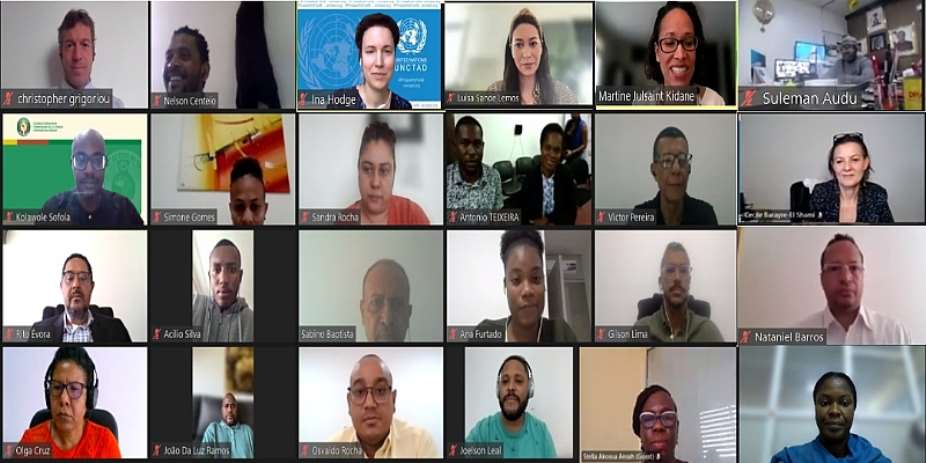The Economic Community of West African States (ECOWAS), in collaboration with the United Nations Conference on Trade and Development (UNCTAD), met with members of the Federation of West African Chambers of Commerce (FEWACCI) and other representatives from the organized private sector to discuss cross-border e-commerce opportunities and challenges.
In a virtual meeting which took place on the 13th of June 2022, members of the private sector shared their views on how the ECOWAS E-commerce strategy, which is currently being developed, could enable cross-border e-commerce in the region.
Private sector representatives were given the opportunity to comment on the results of the UNCTAD “eTrade Readiness Report for Member States of the ECOWAS Region” and to share their views on the challenges businesses encounter when engaging in e-commerce in the region.
Mr. Kolawole Sofola, Ag. Director Trade, ECOWAS Commission, on behalf of H.E. Mr. Jean-Claude Kassi BROU, the President of the ECOWAS Commission, and Mr. Tei KONZI, Commissioner of Trade, Customs and Free Movement, thanked the government of the Netherlands for its support. He also welcomed the engagement of the private sector and noted that the “ECOWAS Commission see the future e-commerce strategy as an instrument for trade integration and development within the region, as well as a tool to support the competitiveness of the private sector on the continent, especially in the context of the African Continental Free Trade Area.” Finally, he urged regional business associations to start creating opportunities that support cross-border private sector cooperation on e-commerce.
Remarks were also made by the project donors represented by Ms Caro Krijger, Policy Coordinator Trade Facilitation & Regional Market Integration, Directorate-General for International Cooperation, Ministry of Foreign Affairs Netherlands; Mr Aminou Akadiri Executive Director FEWACCI, on behalf of Mr. Faman Toure, President, Federation of West African Chamber of Commerce, and Industry (FEWACCI); Dr. Anthony Luka Elumelu, Ag. Director Private Sector, ECOWAS Commission; and Ms. Ina Hodge, Programme Management Officer, Digital Economy Capacity Building Section, E-commerce and Digital Economy Branch, UNCTAD.
The speakers highlighted the importance of e-commerce to the region and noted the progress made towards the development of an ECOWAS E-commerce strategy. Emphasising the potential contribution such as strategy could have for job creation, structural change, and regional
Page 2/2
integration. And noting the important role of the private sector’s contribution to the development of e-commerce.
FEWACCI’s Executive Director, Mr. Aminou Akadiri, shared the perspective of the Federation on the state of e-commerce in the region. Specifically, the challenge of doing business under the dual legal and regulatory system in West Africa, in addition to existing trade barriers and business environment obstacles that hold back the exchange of goods and services.
During the interactive discussion moderated by Dr. Anthony Luka Elumelu, Ag. Director Private Sector, ECOWAS Commission, participants welcomed the eTrade readiness assessment report and discussed some of the challenges and opportunities for the region in the advancement of e-commerce. Representatives highlighted barriers created by the growing digital divide, large informal sector, weak trade logistics, and low digital literacy. Noting, how these cause barriers to trade and e-commerce in the region.
The importance of inclusion particularly for vulnerable groups in rural areas was raised. It was emphasised, that women and youth should be seen as change agents for the development of e-commerce.
Going forward the significance of aligning the West African Common Industrial Policy (WACIP) to the ECOWAS E-commerce Strategy was also discussed, particularly in deciding who and what areas of production in the region should be targeted.
Source: ECOWAS





 Whoever participated in the plunder of the state must be held accountable – Jane...
Whoever participated in the plunder of the state must be held accountable – Jane...
 A vote for John and Jane is a vote to pull Ghana from the precipice of destructi...
A vote for John and Jane is a vote to pull Ghana from the precipice of destructi...
 I’ll repay your abiding confidence with loyalty, understanding and a devotion to...
I’ll repay your abiding confidence with loyalty, understanding and a devotion to...
 ‘I’ve learnt deeply useful lessons for the future' — Serwaa Amihere breaks silen...
‘I’ve learnt deeply useful lessons for the future' — Serwaa Amihere breaks silen...
 I’m sorry for the embarrassment – Serwaa Amihere apologises for leaked sex video
I’m sorry for the embarrassment – Serwaa Amihere apologises for leaked sex video
 Dumsor: Matthew Opoku Prempeh not in charge of Energy sector – Minority
Dumsor: Matthew Opoku Prempeh not in charge of Energy sector – Minority
 Adu Boahen’s murder: Police arrest house help who was in possession of deceased’...
Adu Boahen’s murder: Police arrest house help who was in possession of deceased’...
 Akufo-Addo nominates Felicia Attipoe as Tema West MCE
Akufo-Addo nominates Felicia Attipoe as Tema West MCE
 Election 2024: I can't have someone I defeated twice as my successor – Akufo-Add...
Election 2024: I can't have someone I defeated twice as my successor – Akufo-Add...
